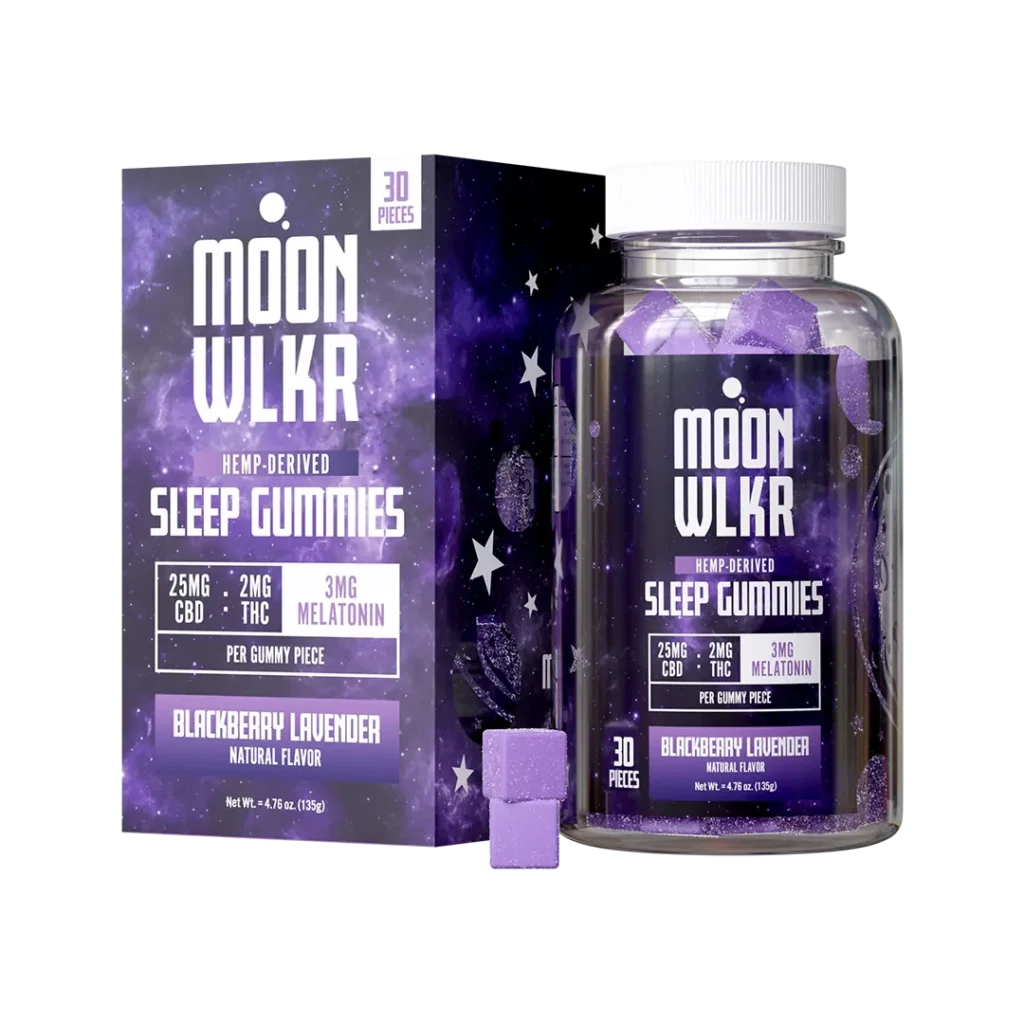Are Delta 8 Gummies Good for Sleep?
Are Delta 8 Gummies Good for Sleep?
Oct 18, 2023
In the quest for a good night’s sleep, many individuals are turning to alternative remedies to combat insomnia and restless nights. One such remedy that has gained significant attention in recent years is Delta 8 THC, often consumed in the form of Delta 8 gummies.
As the interest in natural sleep aids grows, it’s crucial to explore whether Delta 8 gummies can truly deliver the promise of a more peaceful slumber. Delta 8 THC, a lesser-known cousin of the more widely recognized Delta 9 THC found in marijuana, has emerged as a potential solution to those seeking relaxation and improved sleep quality.
But how does it work, and is it safe and effective for addressing sleep issues?
This article delves into the science behind THC, it’s relationship with sleep, potential benefits, and tips for responsible usage. Readers will be offered an informative guide to help them make informed decisions about this intriguing sleep aid option.
What are Delta 8 Gummies?
Delta 8 THC gummies are a popular edible product that contains Delta 8 Tetrahydrocannabinol (THC), a natural compound found in the cannabis plant. These gummies are a convenient way to consume Delta 8 THC, offering a measured dose of the compound in a tasty, candy like form. Delta 8 THC is often acknowledged for its potential to induce relaxation and improve mood which makes these gummies an appealing choice for those seeking an alternative to conventional THC products such as Delta 9 THC, without the more intense psychoactive effects.
How Does Delta 8 Help With Sleep?
Within your body, numerous intricate systems work together to maintain optimal health. Among these systems is the endocannabinoid system (ECS), akin to systems such as the digestive or cardiovascular systems.
The endocannabinoid system (ECS) has three main parts:
- Natural compounds called endocannabinoids that react to changes inside your body.
- Receptors (CB1 and CB2) located throughout your body and in your nervous system.
- Enzymes that break down endocannabinoids after they’ve done their job.
The ECS helps manage various functions like pain, mood, appetite, metabolism and sleep. When compounds like Delta 8 THC from plants interact with the ECS, they can affect these functions, potentially influencing sleep, and other processes.
However, scientists are still studying exactly how these interactions work and what effects they may have. The CB1 receptors, mentioned as part of the ECS are mostly concentrated in the spinal cord and brain which may explain the cognitive effects associated with a Delta 8 high.
Data has shown that CBD can calm anxiety, making it easier to fall asleep.
Like CBD, Delta 8 is also a cannabinoid and therefore, likely behaves in a similar way. According to the National Cancer Institute (NCI) Delta 8 exhibits a distinct quality: it binds not once, but twice, to the cannabinoid receptors in the nervous system.
These receptors play a key role in modulating sleep by calming processes like breathing, heart rate and mental activity. This interaction suggests that Delta 8 might have the potential to help regulate your sleep cycle and create a serene atmosphere conducive to rest.
America’s Sleeping Problem
Around two-thirds of adults occasionally experience insomnia symptoms, according to the sleep foundation. So, if you are someone who has trouble falling asleep, or staying asleep, then you are certainly not alone.
Sleep is vital for our well-being. It supports physical health by enabling tissue repair, immune system function, and hormone regulation. Mentally, it enhances cognitive function, memory and emotional stability.
Quality sleep leads to alertness and productivity, while maintaining a positive mood and reducing stress.
In essence, sleep is essential for our overall health and quality of life. Given how important sleep is, and how desperate many of us are to have it, it’s no wonder that sleep aids are a hot commodity. Research published in the Journal of Psychoactive Drugs that of surveyed adults who tried cannabis to support their sleep, found it to be either ‘very’ or ‘extremely’ helpful.
Delta 8 may make you sleepy by suppressing arousal and increasing sleep-promoting adenosine.
Does Delta 8 Affect REM Sleep?
Rapid Eye Movement (REM) sleep is a critical stage of the sleep cycle characterized by vivid dreams, rapid eye movements, and heightened brain activity.
It plays a crucial role in memory consolidation, learning, and emotional regulation. Delta 8 THC, like other cannabinoids, may have an impact on REM sleep, although research in this area is still limited.
Some users of Delta 8 have reported changes in their sleep patterns, including increased dream activity during REM sleep.
Anecdotal evidence suggests that Delta 8 THC may influence the intensity of frequency of dreams during REM sleep. Brief use of cannabis seems to enhance the duration of deep sleep, the stage responsible for waking up feeling rejuvenated. The presence of THC reduces the duration of REM sleep according to studies.
This can be advantageous however, particularly in individuals with post-traumatic stress disorder (PTSD) given that nightmares can be prevalent and distressing.
A study involving synthetic forms of cannabis observed a significant reduction in nightmares, with some participants reporting a complete cessation of such dreams among those with PTSD. Additionally, a subset of participants noted improved overall sleep quality and a decrease in daytime flashbacks.
Of course, the relationship between Delta 8 and REM sleep is complex and will vary from one individual to the next. Some people may experience more vivid dreams, while others may not notice a difference in dream pattern.
What Are the Pros and Cons of Using Delta 8 For Sleep?
Pros of Using Delta 8 for Sleep:
1. Induces Drowsiness and Calmness:
Delta 8 has the potential to induce drowsiness and promote a calm state of mind, especially when combined with a relaxed sleep environment.
2. Mindful Sleep Practices:
Creating a tranquil sleep space by dimming lights, playing gentle music, and practicing good sleep hygiene, such as avoiding blue lights before bed, can enhance the effectiveness of Delta 8 for sleep.
3. Optimal Timing:
Taking a Delta 8 gummy around 30-60 minutes before bedtime is ideal for maximizing its sleep-inducing effects.
4. Start Low and Slow:
Especially for newcomers to Delta 8, the “low and slow” approach is essential. Begin with a low dosage and gradually increase it to gauge its impact on your sleep quality.
Cons of Using Delta 8 for Sleep:
1. Psychoactive Effects:
Delta 8 THC is psychoactive, which can result in a stimulating or “high” feeling, especially for those new to it or when higher doses are taken. This may lead to alertness rather than relaxation.
2. Potential Tolerance Build-Up:
Chronic use of cannabis, including Delta 8, as a sleep aid, may lead to tolerance, requiring higher doses to achieve the desired effects. Over time, you may find that you need to take slightly more Delta 8 in order to have the same sleep effect.
Long-term and heavy use of any THC product may disrupt sleep patterns in some people.
3. Caution and Moderation:
Wisdom and moderation should guide the use of Delta 8 gummies for sleep, as individual responses vary. Using any sleep aid on a long-term basis is generally discouraged due to potential negative effects on sleep quality.
If considering Delta 8 as a sleep aid, it’s advisable to seek guidance from a healthcare professional to ensure it aligns with your unique health circumstances. Research on Delta 8 THC’s effects on sleep is ongoing, and caution is essential.
Using Delta 8 With Other Sleep Aids
Various natural remedies, such as melatonin, magnesium, and valerian root, can contribute to improved sleep. However, it is important to note that while these natural sleep aids can be beneficial, they should not serve as substitutes for cultivating healthy sleep habits.
Effective sleep hygiene encompasses both a bedroom setting and daily routines that foster consistent, undisturbed sleep. This includes maintaining a regular sleep schedule, creating a comfortable and disturbance-free sleep environment, and cultivating healthy daytime habits which all collectively support optimal sleep quality.
Delta 8 and Melatonin for Sleep
Melatonin is a widely recognized sleep aid and is a natural hormone that our bodies naturally produce at night. It serves as a biological signal indicating when it’s time to sleep and encourages sleep readiness in the brain’s default mode network. (DMN).
Combining Delta 9 with a melatonin supplement could potentially enhance its sleep-promoting effects.
Delta 8 and Magnesium for Sleep
Exploring the combination of Delta 8 and magnesium as a sleep aid presents an intriguing avenue for those seeking improved sleep quality. Magnesium is a vital mineral involved in numerous bodily functions and plays a role in muscle relaxation and in calming the nervous system which makes it a popular choice for addressing sleep issues.
Delta 8 and Other Cannabinoids for Sleep
Combining cannabinoids enhances the potential for experiencing the Entourage Effect, which results in a more pronounced and comprehensive impact.
In the context of sleep and relaxation, this synergy can lead to quicker and more accessible effects. Whether it’s Delta 8 paired with CBD or other cannabinoids, the goal is to harness the collective benefits.
Did you know Moonwlkr has a Delta 8 product specifically designed to help improve your sleep? Discover the perfect recipe for a good night’s sleep here.
In the quest for better sleep, Delta 8 THC gummies have emerged as an intriguing option.
While some individuals report benefits, the relationship between Delta 8 THC and sleep remains a subject of ongoing research.
Moreover, it’s essential to consider the broader context of sleep health. Combing natural remedies like melatonin with responsible sleep habits can contribute to more restful nights.
Ultimately, whether you choose to explore to explore Delta 8 gummies for sleep aids, the key is to prioritize your well-being. Sleep is fundamental to our lives, and understanding the potential benefits and risks to sleep aids is a valuable step to achieving the rejuvenating rest we all deserve.





